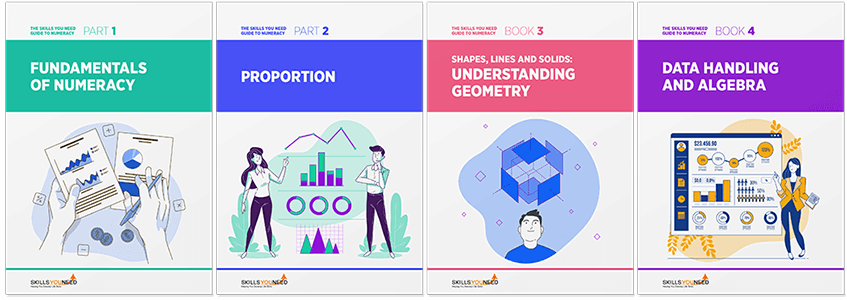The Role and Importance of
Numerical Skills Today
Transferable Skills
From divvying up a restaurant bill among your friends, telling the time on a 12-hr clock, to tougher activities such as mixing the right proportions of different ingredients, mathematics is an essential tool in our everyday lives. This notion alone is enough to give many the willies, especially for those who associate their poor mathematical abilities with the very well-known label that says “I am just not a math person”.
However, this building block of engineering and sciences is not just for cracking onerous physical problems like quantum gravity but is also a skill that allows us to solve many of the practical problems that we stumble upon in our daily lives.
Numerical skills refer to one’s ability to grasp the fundamental concepts of basic maths operations, such as addition, subtraction, division, and multiplication. More advanced mathematical skills may cover the understanding of algebraic and calculus concepts, and even the ability to draw on statistical knowledge to solve real-world problems.

The Importance of Numerical Skills in Today’s Era
The COVID-19 pandemic brought with it a tidal wave of financial troubles across the globe, dealing a heavy blow to the finances of millions or possibly billions of households and individuals. As the pandemic drags on, reports on job losses, closures of stores, and even bankruptcies have frequently hit the headlines; the labor market has been getting increasingly competitive, with some sectors coping with an excessive supply of labor.
That being the case, gearing yourself up with knowledge and skills that will remain relevant across various industries is more vital than ever, and numerical skills are also a reflection of your critical thinking and problem solving abilities. Big companies often rely upon big data to better guide their decision-making; because of this, you can spruce up your resume by just demonstrating a good level of mathematical skills, giving yourself a higher chance in the competitive job market.
Besides, it has been well proven that there is a correlation between financial literacy and numeracy. People who lack confidence in numbers may have a hard time managing their finances, and find living through this pandemic more challenging than those with strong numeracy skills. Even simple financial activities like managing your daily cash inflows and outflows, making price comparisons, and even developing a weekly budget plan demand a certain level of mathematical competency from you.
Three Basic Ways to Improve Your Numerical Skills
We have all become accustomed to hearing the myth of “I am just not a math person”, and many have deeply instilled in themselves the idea that being good at maths is a natural-born talent, and so they are unable to improve their numerical ability. This mentality has been confronting teachers and researchers for many years, and the truth is that all of us can essentially be math people. If your thoughts tell you otherwise, you have probably been helping nurture a myth that has been considered one of the most destructive ideas in the US.
With all that said, everyone, including you, has the ability to succeed in learning mathematics. With effort, patience, and the right strategies, you can definitely witness an improvement in your numeracy skills. Here are some of the steps that you can take to enhance your own mathematical ability.
Don’t Memorise
With maths, it is not all about memorizing countless mathematical laws and principles, and in fact, memorizing facts and procedures is what you should avoid at all times in the learning process. Many arithmetic operations like addition, subtraction, division and multiplication, and even operations on square roots carry their own intuitive meanings that we can easily understand. Aside from these, you should also be familiar with the properties of numbers, such as the commutative, associative, distributive, and identity. Learn to recognize the patterns behind these operations and understand them.
Tougher mathematical concepts like trigonometry, algebra, and calculus require considerably more time to learn; however, the benefits of learning these are tremendous. They have a wide range of applications in real life, equipping you with the skills to unravel varying puzzling problems you may encounter either at work or in your personal life. A very simple yet practical question can involve the use of all of these concepts - that is, for instance, what is the maximum area of a rectangular we can have given the length of the perimeter is restricted to a maximum of 10 meters?
Practice, Practice, and Practice - Don’t Be Afraid of Making Mistakes
Many of us may think that making mistakes is wrong. However, it is actually part of the learning journey of mathematics. Recent neurological research has shown that making a mistake is not a bad thing; as we reflect upon the mistakes we have made, it is a great time for our brains to grow.
You should learn to embrace whatever mistakes and faults you have committed and turn them into a learning opportunity. When it comes to mastering mathematics, there are no magic tricks besides patience and effort. As you practice, your performance will improve so will your understanding. The more problems you solve, the better you will get at handling those types of problems.
Frequent practice of applying mathematical concepts and techniques helps you develop mastery of various mathematical skills and operations. You will be capable of adopting various mathematical techniques to solve problems in business, science, or daily life.
Don’t Be Hesitant to Look for Help
The internet is rife with resources and free-to-download applications that may guide you through the learning process, or you can always recur to an online math calculator, such as an arithmetic sequence solver, when you're in need of clear explanations and step-by-step examples to help with your math needs. For instance, if you are trying to come up with a mathematical function or model that calculates the savings you will get from leasing a car as opposed to purchasing one, Orix has a calculator on their website that you can use to determine the correctness and accuracy of your calculations. However, if you're interested in learning math fundamentals, such as the difference between even and odd numbers, you can check out instructional videos on Smartick. This will help you better understand the number system and better prepare you for whole number operations.
Lastly, in addition to the numeracy skills pages on Skills You Need, there are lots of other websites offering free online courses in mathematics, some even award certificates at an affordable price. These courses cover simple mathematical subjects to more advanced ones like linear algebra and discrete mathematics, and it is never too late to embark on a lifelong journey of learning in the field of mathematics to master numeracy skills.
Further Reading from Skills You Need
The Skills You Need Guide to Numeracy

This four-part guide takes you through the basics of numeracy from arithmetic to algebra, with stops in between at fractions, decimals, geometry and statistics.
Whether you want to brush up on your basics, or help your children with their learning, this is the book for you.
About the Author
Craig Lebrau is the CMO of Media Insider, a Wyoming-based PR company that aims to disrupt the way companies communicate their brand in the digital era.

